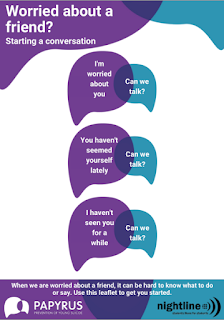Active listening is not only a valuable soft skill that
employers look for, it also helps you become better at supporting someone emotionally
through times of need. We hear the term bandied about, but what does active
listening actually involve?
Below, I’ve included some tips on how we can be better
listeners:
Acceptance and Non-Judgement
People come from different backgrounds and have different
experiences shaping their views. The fear of judgement can stop people opening
up about themselves or their problems. Showing the person you are listening to
that you are not judging them can help them feel less afraid to open up. Listen
with an open mind and try to recognise how your own background and views may
influence your perception of what the other person is saying. Try not to make
judgemental comments about what the other person is saying or jump to conclusions.
You could actively reassure the person that you are not judging them and you
accept them for who they are, if they are opening up about a topic that’s very
sensitive in nature or that they are really afraid of talking to anyone about.
Listening
This may sound like an obvious one, but one of the first rules
of active listening is actually showing someone that you are listening to them.
That involves not going on your phone to scroll through Instagram mid-conversation,
making eye-contact with the other person (to the extent that you’re both comfortable
with of course), and showing through your facial expressions that you are
really registering their message. The use of non-verbals is also a golden
strategy, especially if the conversation you are having is over the phone where
you cant use visual cues to show that you are listening.
Empathy
Many people get confused about the difference between
empathy and sympathy. Imagine that someone is drowning in a pool and needs your
help. Sympathy would be feeling sorry for the person, whereas empathy would
lead you to actually throw out a rope for them. You can see which of the two is
more helpful. Empathy involves actually trying to put yourself in the other
person's shoes and see where they are coming from, whilst sympathy involves simply
pitying the other person. It’s not always going to be easy to put ourselves in
others shoes if they are going through something we have no experience of ourselves
or cant really relate to, but we can at least try to better understand their
experiences by asking questions. We can use our words to acknowledge their
struggles and emotions, and avoid minimising their problems by bringing up a
problem of your own that you thought was worse.
Reflection
Reflective listening is a method of communication which
involves two key steps: seeking to understand what the other person is saying,
then offering the idea back to the speaker (e.g. paraphrasing what the speaker
has just said) to show that you have been really listening. It's also important
to reflect the language that the other person has been using- this reduces the
risk of you appearing to make any assumptions about the other person. You
should also reflect tone of voice (this doesn't have to mean matching the tone
of voice exactly, it can be closer to neutral). You can imagine that it may not
come across well if the person you’re listening to sounds very despondent, and
you reply in a very cheerful tone of voice. To illustrate this, I’ve included a
link to a video clip of Inside Out (a great movie I’d recommend).
And lastly, remember to take care of yourself! Supporting others whilst we are emotionally and mentally drained ourselves can be difficult, so it's important to remember to look after yourself. If that means that you aren't able to support someone at the moment, that's okay, your needs come first. If you need to talk to someone, Nightline is here to listen (go onto nightline.org.uk for contact details).
If you’re staying tuned to our Instagram, Facebook and Twitter
(@LondonNightline), you’ll see our daily listening tips! And if you have any
questions about anything mentioned in this blog post, please put them in the
comments.
Warmly,
Anon

